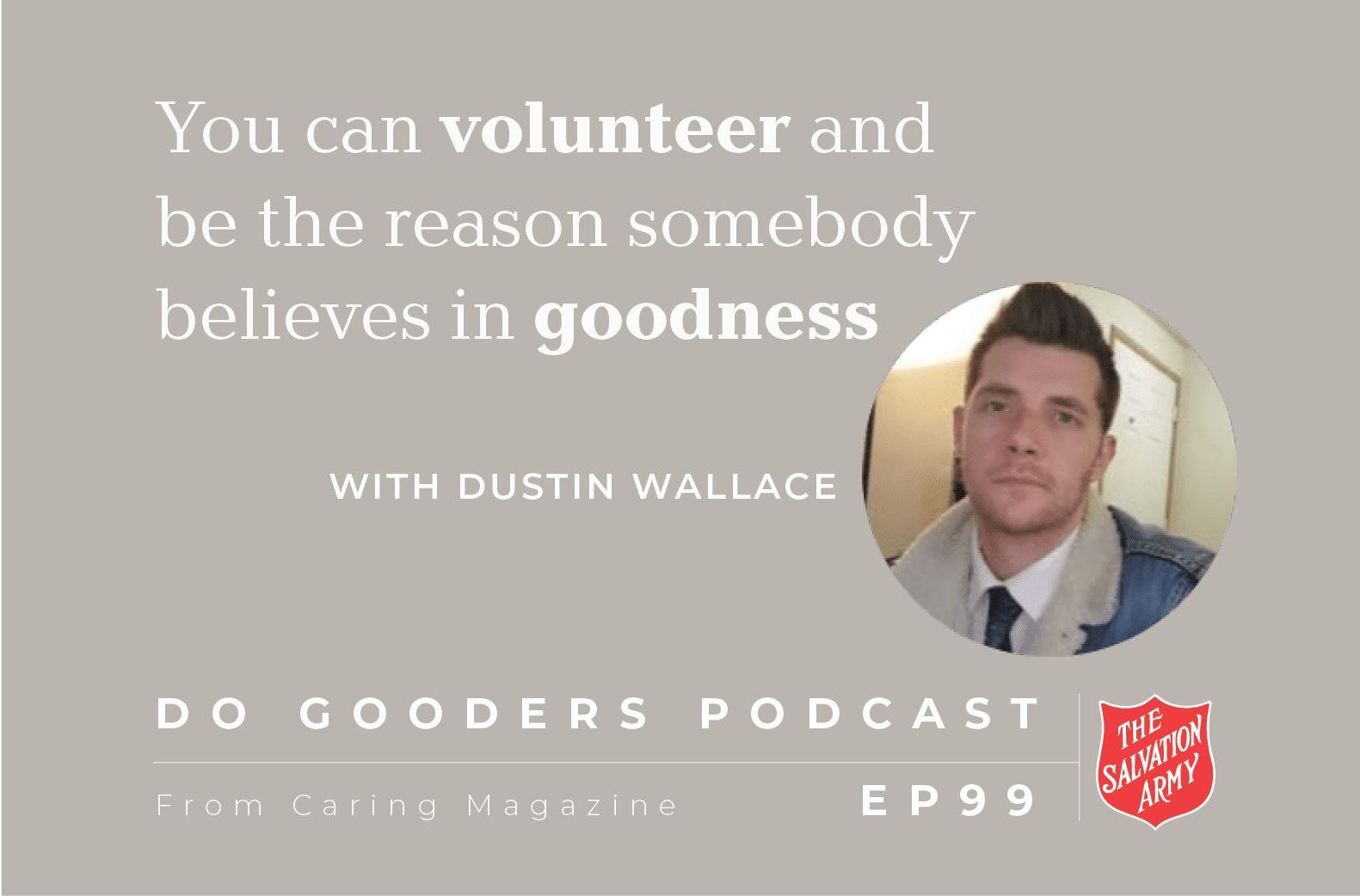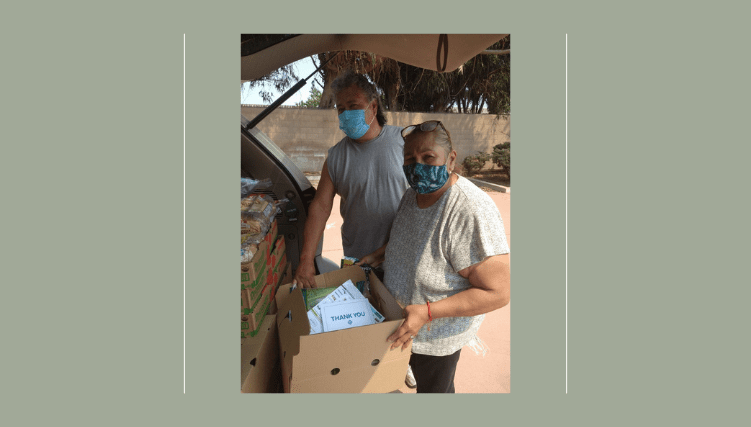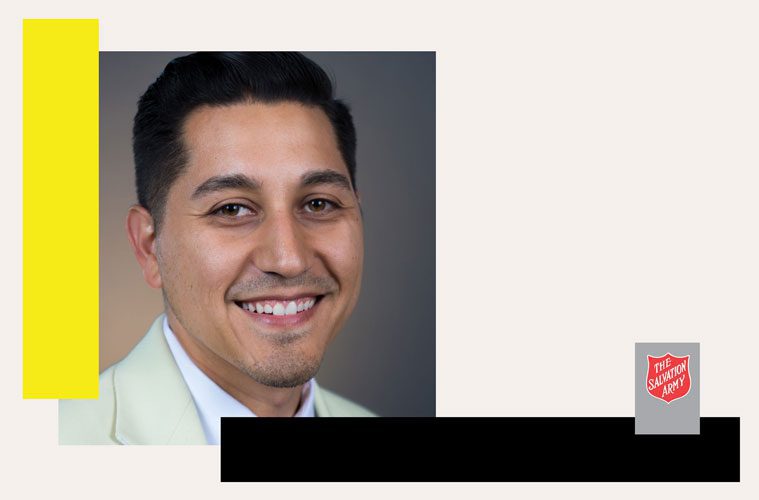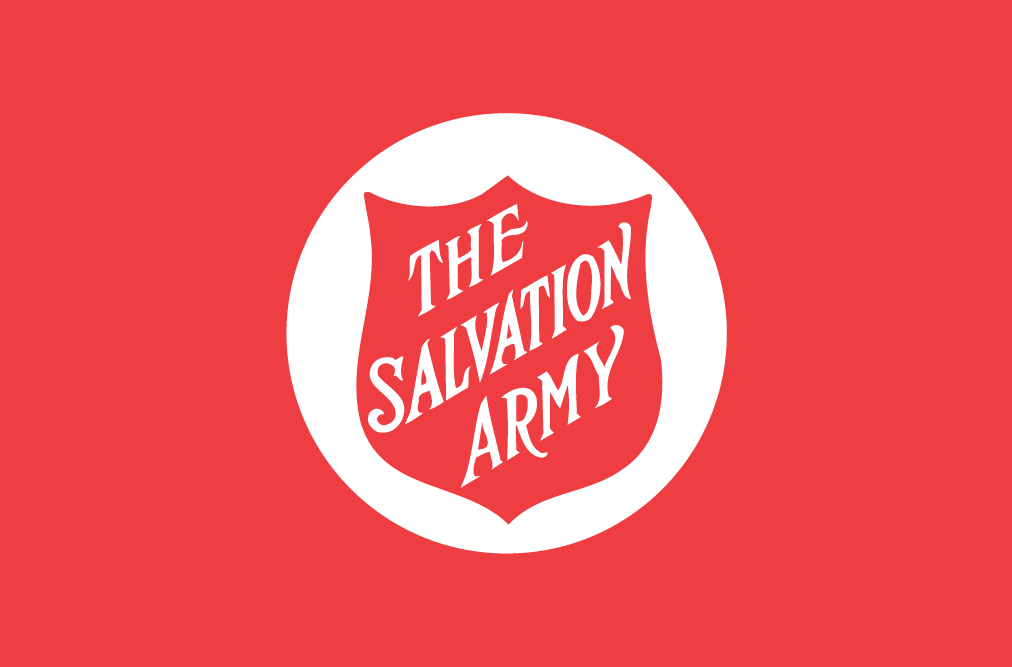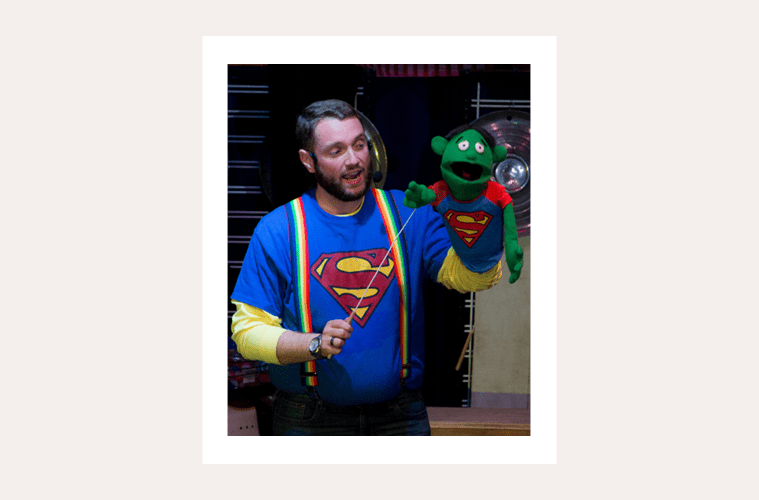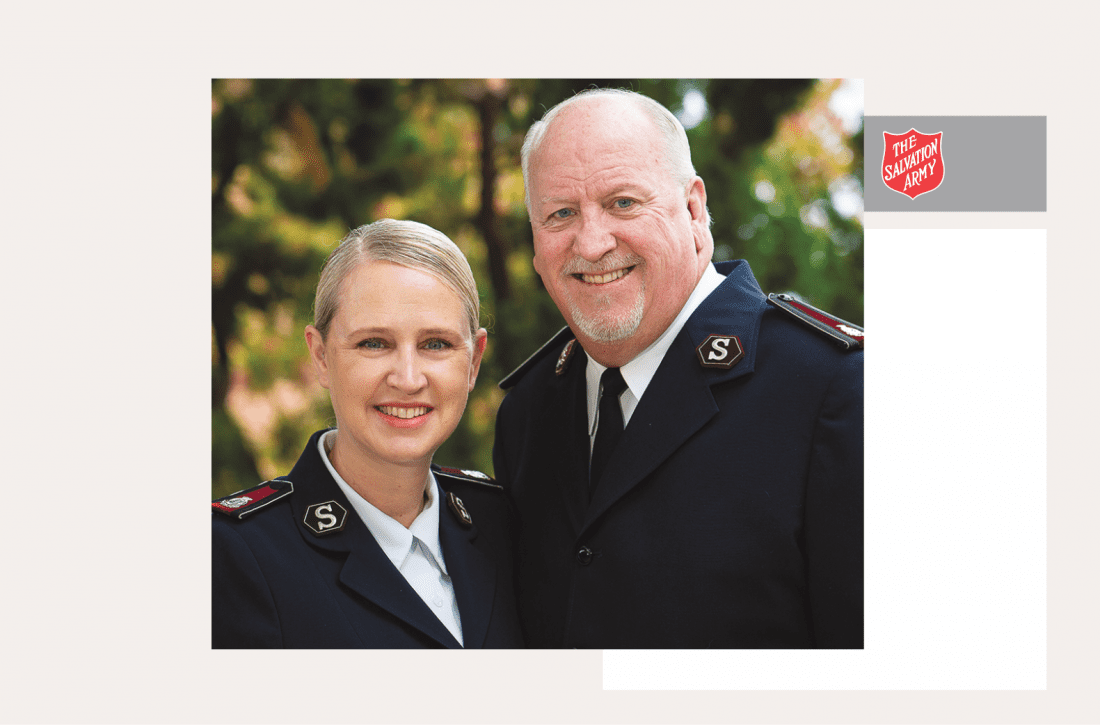It’s the season of giving.
Giving love, giving thanks. Giving to a red kettle near you.
And while those bells ring, it’s also a season when many give of their time.
They volunteer.
Each year more than 3 million people of all ages volunteer their time, talents and resources to assist The Salvation Army’s work across the U.S. These volunteers are critical partners in helping The Salvation Army fulfill its promise of “Doing the Most Good.”
And yes, 3 million people is a lot of people. So I’d like to introduce you to just one of them today.
Dustin Wallace is a long-time Salvation Army volunteer because he loves it.
He’s a graduate of The Salvation Army’s addictions rehabilitation program and now attends The Salvation Army corps, or church, in Seattle. He regularly volunteers alongside his husband—from distributing meals or hygiene items to those experiencing homelessness, ringing the bell at a kettle or assisting in the toy distribution at Christmas.
He’s here to share more about his experience with the organization, why he chooses to give back and why he believes anyone can be the reason somebody believes in goodness.
Show highlights include:
- More on Dustin Wallace’s story.
- A moment in his life that made an impact on who he is today.
- The best piece of advice he’s received along the way.
- Why he decided to deepen his engagement with The Salvation Army.
- What Dustin loves about the organization.
- How faith impacts his life on a daily basis.
- Why he chooses to volunteer.
- A volunteering experience that stands out.
- What he’s learned through volunteering.
- What he would say to others about volunteering.
- What hope means to him.
- His encouragement for how to find hope today.
Listen and subscribe to the Do Gooders Podcast now. Below is a transcript of the episode, edited for readability. For more information on the people and ideas in the episode, see the links at the bottom of this post.
* * *
Christin Thieme: Dustin, welcome to The Do Gooders Podcast today. Thank you for being here with us.
Dustin Wallace: Yeah, you’re welcome. Thanks for asking me.
Christin Thieme: It’s great to be talking to you today and in the midst of this wonderful holiday season. I’m wondering if you can start out with a little bit of a rundown for us on what’s your story and what brought you to who you are today? Just a small question for you.
Dustin Wallace: Yeah, sure. Well, I’d say briefly that I grew up in a pretty unstable home, although we were taken care of pretty well financially, emotionally, and physical psychologically, it was a pretty unsafe environment. I was a victim of abuse as a young child, and in my pre-teens I testified in court against a family member that abused me.
Christin Thieme: Oh wow.
Dustin Wallace: After that my siblings were embarrassed and turned their anger against me. So yes, I was raised in a very abusive and unsafe home. My only escape from that was in my schoolwork, I dedicated my time and energy to controlling my education because I could not control anything else in my life. I tried to earn approval and acceptance from other people through my academic achievements, and my attempt to find belonging and value from teachers and peers and in my family. As an adult I became addicted to drugs. And after many years of using I began the road of recovery and now I have almost five years clean and sober.
Christin Thieme: Congratulations.
Dustin Wallace: Thanks. Yeah, that’s pretty much just a brief of my story.
Christin Thieme: Wow. So that’s a lot, but amazing that you are now five years clean and sober, that’s fantastic. I mean, there were a few moments there, but is there any one moment that really stands out in your life of, something that really made an impact on you maybe for good and made an impact for who you are today and on the path that you ended up taking?
Dustin Wallace: Yeah. Well, I mean the trauma I faced as a child and as an adult has really shaped me like who I am as a person and has made me very empathetic toward others in their hardships. As an adult I had a partner who also abused me in every way possible. And so as a child I spoke out against my abuser, but then as an adult I was silent for a pretty long time, didn’t want to tell my partner. But then eventually I realized how badly I needed to use my voice and I spoke out. And so no matter what happens now I’m committed to using my voice and I use that voice to fight for justice and truth, and what I believe is right. But if we were like to pinpoint like a place that made an impact, I’d definitely have to say The Salvation Army Adult Rehabilitation Center in Seattle, where I went to rehab. Upstate made such an impact on me, and it was through that program that I discovered that recovery was possible from my drug addiction.
Christin Thieme: Maybe you could tell us a little bit more about that. Well, is that the first time that you met The Salvation Army and just briefly what was that experience like?
Dustin Wallace: Yeah. So I didn’t know anything about The Salvation Army until going through the rehab program. I thought it was just a thrift store, but I found out that it was a church and so many different services and programs that they offer. And what was it like? I mean, it was a pretty incredible experiences, pretty eye opening. I mean they had me doing recovery meetings, but also counseling and working on myself and it was a working rehab therapy, so it was free, which was amazing. But I also had to work in the warehouse, but it taught me how to work again and have a set of rules and accountability and pretty incredible, pretty hard though. It’s a challenging program, but definitely worth it. A lot of things that are challenging are often worth it, right?
Christin Thieme: Yeah. That’s so true.
Dustin Wallace: Yeah.
Christin Thieme: What do you think the best piece of advice you received along the way that’s something that stuck with you?
Dustin Wallace: Well, I read once someone said, “Be the reason that someone believes in the goodness of people,” and that really stuck with me and I tell myself that all the time, I want to be the reason that someone else believes in the goodness of people. Also, since I’m pretty hard on myself all the time, I remind myself that I never lived this day before and it helps me give myself a little bit more of a break and not to be too critical when I don’t know what to do.
Christin Thieme: Yeah, absolutely, yes. Beautiful advice on both sides.
Dustin Wallace: Yeah. Like I’ve never lived this day before, so I’m doing my best for today and I shouldn’t have expectations on how I’m going to do today because I’ve never been to this day before, I’m brand new—just learning.
Christin Thieme: That’s so true. All of us. So when you say, that idea you try to keep in mind of being the reason somebody believes in good. Is that what led you into further deepening your engagement with The Salvation Army? I mean, I know that you volunteer today, so maybe you can tell us a little bit more about how you got further engaged and why, and what it is that you love about The Salvation Army?
Dustin Wallace: Yeah. Well, when I went through the rehab center, I had no idea what The Salvation Army was. Like I said, I thought it was just a thrift store, but when I found out that it was a free rehab and options available to people suffering from addiction, I was all in. And then after graduating in that program I did stay clean for a little over a year, but then I relapsed for 10 months. But through my relapse in that time, The Salvation Army, members of the church, and in that rehab program, they never stopped loving me and reaching out. When I did finally go back to church at Seattle Temple Corps, the pastors there at the time, the majors wired in, they welcomed me and encouraged me in getting clean again. And for anyone listening who doesn’t know the majors, they are the pastors of the church.
I did learn through my relapse that I need to take recovery seriously by giving more of myself to others. And that meant getting involved in the church again and attending various 12 set meetings and programs and all the volunteering that I do. So that’s why I volunteer. It’s through my relapse that I realized I wasn’t living for others so much before my relapse. And yeah, now I’m all about like trying to help others so that I can.
Christin Thieme: What do you love about The Salvation Army?
Dustin Wallace: I love how much hope The Salvation Army brings to the world. Although there are some things that I wish I could change or that were different about The Salvation Army, I still believe in the core mission of The Salvation Army, which is to preach the Gospel of Jesus and to meet human needs in His name, without discrimination. I love how, whenever and wherever there is a disaster or a need, The Salvation Army is there providing material aid as well as emotional and spiritual support. I love how much the church and the services of The Salvation Army do for so many different groups of people. I have never seen any other organization quite like it.
Christin Thieme: Yeah, that’s so true. When you talk about the core mission, can I ask, how does faith impact your own life on a daily basis?
Dustin Wallace: Yeah, faith is a bedrock of my life today. I pray every morning for God to use me. I wouldn’t say faith impacts my life; I’d say that faith is my life. I try to live my life on faith. I practice faith by trusting others, forgiving them, and trusting that, no matter what, God has a plan for me, and that that plan is good.
Christin Thieme: Can you share a little bit more about your experience volunteering, what you’ve done, what you do now, maybe what you’re doing this season even, over the holidays? And what if anything stands out to you, like an experience of that can help to kind of illustrate why you keep doing it?
Dustin Wallace: Yeah. Well, I’ve had lots of volunteering experiences over the years, whether it be food district to families in need, or cold weather shelters from the heat, bell ringing to raise money for those in need in the community during the holiday season. Let’s see, I would say like giving toys to children at toy distributions during the Christmas time season brings me a lot of joy, because all the kids are excited and yeah, that really just touches my heart.
Another would have to be the homeless outreach I’ve done over the years. My husband and I used to deliver dinner to homeless encampment and eat with them once a week and that was always pretty special. We aren’t doing that anymore currently, but what my husband and I do now is we go out on the streets and we deliver care packages with toiletries, to homeless people, as well as bottled water, snacks to eat, sock gloves, hand warmers, depending on what the weather is in the season. This has brought us a lot of joy.
No matter how tired we are neither one of us have ever regretted going out and doing it after every single time. We walk around or we drive around, we keep supplies in the car, anyone listening right now could do it too. And it makes such an impact to others who are truly in need of love and a small gesture. My advice though real quick is for anyone who wants to go out there and do it to go in a pair so they’re not alone. It’s a safety thing. But acts like that can influence our world and it does influence those individuals’ worlds. I know personally because I used to be homeless and would doubt the goodness of people. Now I’m given the opportunity today to be on this side of it and I have to use this chance that I’m given.
Christin Thieme: Yeah. What an experience. I mean, you have such a breadth of just this amazing history that really allows you to interact with people in a beautiful way. So thank you on behalf The Salvation Army for giving of your time in that way. What have you learned, would you say through volunteering?
Dustin Wallace: I’ve learned that there’s a lot of work that goes into volunteering.
Christin Thieme: True.
Dustin Wallace: I’ve also learned that it can be so rewarding as well. I’ve learned that there’s a lot of planning that goes into the many programs offered by The Salvation Army. I’ve also learned that regardless of ability or level of service that every little bit helps. I think that volunteering teaches me daily to always remain grateful. I’ve learned that even on days I don’t want volunteer that I’m always pleasantly surprised.
Christin Thieme: Hmm, yeah, definitely. It’s beautiful. When, so you already encouraged people to get involved with volunteering and you mentioned every little bit counts. How would you suggest somebody start who maybe hasn’t volunteered before? Where would be your piece of advice on how to get involved?
Dustin Wallace: Well volunteering can be anything from distributing boxes, to food lines of cars at a food drive, or simply offering a kind word and a sandwich to someone experiencing homelessness. It doesn’t have to be a big event, organized by a professional or involving a lot of people. As I said before, my husband and I try to keep socks and gloves in our car that we hand out to homeless people. We use this opportunity to talk about The Salvation Army and to talk about recovery to other people. I think that volunteering doesn’t have to be structured. Any types of service for others can be classified as volunteering.
Christin Thieme: Yeah, that’s a great point. Absolutely. Will you be volunteering this holiday season?
Dustin Wallace: Oh, for sure. Yeah. Christmas is a busy season, both personally and in The Salvation Army. This year there’s some major changes on how they’re going to distribute the toys like in the Seattle area, but I’m still going to be volunteering with that. And where there’s change there’s usually opportunity for new challenges and new solutions. I do enjoy feeling a part of and being able to bring joy to others. It’s such an amazing gift and I can give it freely.
Christin Thieme: I love that. So this holiday season, The Salvation Army is talking a lot about hope and this idea that hope marches on. So I’m wondering, what does hope mean to you?
Dustin Wallace: To me hope means that I don’t need to be stuck in my feelings of helplessness. I like that motto, that hope marches on, I hadn’t heard that before. So to me hope marches on gives me the implication that regardless of what is happening in the world, socially, politically, or economically that we as an organization and as Christians as a whole have an obligation and a responsibility to continue to strive toward bringing hope to others. There’s a lot of hopelessness in this world and I think that hope marches on means that we continue to work towards bringing hope to anyone and everyone.
Christin Thieme: Definitely. So how would you encourage someone listening today, one tangible thing somebody could you today to find hope?
Dustin Wallace: Well, I’d say that if you’re battling addiction or homelessness, that there are people in organizations that want to help, like no matter how alone you may feel, no matter how ashamed you might feel sitting in front of a grocery store or begging for change at a gas station, that feeling isolation and loneliness is temporary. The world might seem unfriendly or hopeless, but as a whole people want to be seen as good. And I truly believe that and that means that people want to act in a way that is good. People might just be scared or unsure how to help, but there are people out there who want to help. I want to encourage those listening to take action. It is up to us, this is our world. So I would just say, get involved, start helping, you can find hope in that way. I mean I find more hope when I’m being of service to other people like it helps me escape my own helplessness and my own feelings.
Christin Thieme: Hmm, absolutely. Well Dustin, thank you so much for sharing. Thank you for all of the work that you’re doing, and for being one of those reasons people can believe in goodness.
Dustin Wallace: Thanks. I appreciate that. And I just want to remind anyone listening that, to remember that even small steps are steps and that we need to start taking them, and that we can all be a light to those in darkness and it’s so easy to just step up.
Additional resources:
- See how The Salvation Army fights addiction.
- You’ve probably seen the red kettles and thrift stores, and while we’re rightfully well known for both…The Salvation Army is so much more than red kettles and thrift stores. So who are we? What do we do? Where? Right this way for Salvation Army 101.
- Have you ever found yourself wanting to volunteer but unsure of what to do or how to go about it? Here’s the key: You can make an impact in the Fight for Good with whatever time and skills you have. Whatever your interest, there is a you-sized need for goodness in the world. Get the guide on How To Be An Impactful Volunteer with 9 habits to make a difference when giving back.
Listen and subscribe to the Do Gooders Podcast now.











